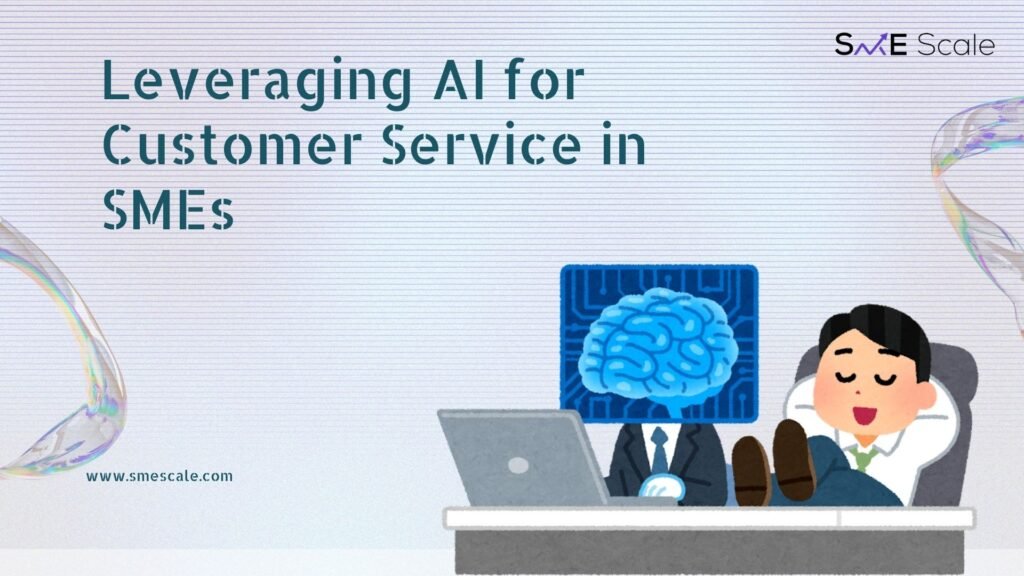Leveraging AI for Customer Service in SMEs: Transforming Client Interactions with Automation

In today’s fast-paced digital landscape, customer service has become a defining aspect of a brand’s reputation, especially for small and medium enterprises (SMEs). AI-powered customer service tools offer SMEs cost-effective ways to provide exceptional support, drive customer satisfaction, and optimize operations. SME Scale, with its focus on digital growth solutions, has implemented AI-driven customer service strategies to enhance client experiences. Here, we’ll explore top AI tools, real-life applications, and the psychology behind AI in customer service.
1. Implementing Chatbots for Instant Responses
AI-driven chatbots are game-changers for SMEs, offering immediate responses to customer inquiries. These bots can be programmed to answer FAQs, resolve common issues, and even assist with the buying process. By automating responses, SMEs can provide round-the-clock support without needing to staff customer service agents 24/7.
Real-Life Case Study
A small online clothing store partnered with SME Scale to introduce a chatbot on its e-commerce platform. Previously, many customers dropped off the site due to unanswered questions about sizes, shipping, and returns. The chatbot now answers these questions instantly, leading to a 30% increase in completed purchases and a reduction in bounce rates.
Psychology Behind It
Immediate responses from chatbots satisfy the customer’s need for instant gratification. People are more likely to complete purchases when their questions are answered without delay, reducing friction in the buying journey. This approach leverages the concept of “the mere exposure effect,” where quick responses build trust and familiarity with the brand.
2. Personalized Interactions Through AI Algorithms
AI algorithms can analyze customer data to create personalized experiences, a crucial factor in retaining loyal clients. With CRM integration, AI systems can personalize recommendations, tailor promotions, and track buying behaviors, delivering relevant information that keeps customers engaged.
Real-Life Case Study
An SME in the health and wellness sector worked with SME Scale to implement an AI-driven recommendation engine. Based on customer purchase history and browsing patterns, the AI would suggest products that aligned with each customer’s needs. This approach increased the average order value by 20%, as customers discovered products relevant to their interests.
Psychology Behind It
Personalized AI-driven interactions fulfill the customer’s desire to feel understood, enhancing loyalty and encouraging repeat purchases. By addressing each client’s unique needs, SMEs create a sense of belonging and satisfaction, increasing the likelihood of ongoing engagement and retention.
3. Enhancing Customer Feedback Analysis
AI can streamline customer feedback by analyzing reviews, social media comments, and survey responses. AI tools categorize sentiments, identify trends, and help SMEs make informed decisions on product and service improvements based on real-time customer feedback.
Real-Life Case Study
A boutique hotel chain utilized SME Scale’s AI recommendation to analyze social media reviews. By categorizing feedback, the AI tool revealed that customers frequently praised the hotel’s decor but mentioned issues with Wi-Fi connectivity. With this insight, the hotel addressed the Wi-Fi problem, leading to a significant improvement in customer satisfaction scores within three months.
Psychology Behind It
AI-driven feedback analysis leverages the “availability heuristic,” where recent, relevant information is prioritized in decision-making. Addressing immediate concerns from feedback not only enhances customer service but signals to clients that their opinions are valued, creating a strong emotional connection and reinforcing loyalty.
4. AI-Powered Email Automation
For SMEs, email marketing remains an essential strategy for customer engagement. AI-powered tools can segment audiences based on behavior, automate responses, and even adjust the timing of email sends to optimize open rates.
Real-Life Case Study
A specialty coffee brand partnered with SME Scale to implement an AI-powered email campaign. By analyzing purchase frequency and preferred products, the brand used AI to personalize email content and send timing based on customer patterns. Within a quarter, the company observed a 25% increase in email engagement, with more customers returning to make repeat purchases.
Psychology Behind It
AI-powered email automation taps into customers’ routines, delivering content when they’re most receptive. By addressing customer preferences and behaviors, AI tools help SMEs establish familiarity, an essential component of trust and engagement in marketing psychology.
5. Optimizing the Customer Journey with Predictive Analytics
Predictive analytics allow SMEs to forecast customer needs, helping businesses anticipate demand, adjust inventory, or design timely promotions. This proactive approach gives SMEs an advantage in maintaining customer satisfaction and sustaining engagement.
Real-Life Case Study
A beauty products retailer working with SME Scale applied predictive analytics to identify peak buying periods and trending product lines. By preparing promotions aligned with anticipated demand, the retailer achieved a 30% increase in sales during high-traffic months, efficiently balancing inventory and marketing efforts.
Psychology Behind It
Predictive analytics leverage the psychological principle of “expectancy,” where customers feel catered to when a brand anticipates their needs. Predictive tools provide an opportunity for SMEs to build brand loyalty by delivering precisely what the customer needs, often before they even recognize it themselves.
Final Thoughts: Building a Customer-Centric Approach with AI
Leveraging AI for customer service can revolutionize how SMEs interact with clients, providing both efficiency and personalization. SME Scale’s approach to AI implementation has shown that integrating technology with customer service can create consistent, high-quality interactions that meet customers’ evolving expectations. By incorporating chatbots, personalized recommendations, sentiment analysis, and predictive tools, SMEs can foster deeper relationships with customers and stay competitive.
AI not only simplifies operations but taps into fundamental aspects of human psychology—such as the need for immediate responses, personalized interactions, and anticipation of needs. For SMEs looking to scale, AI offers tools that enhance customer satisfaction, improve retention, and ultimately fuel sustainable growth in a competitive marketplace. By adopting these AI-driven strategies, SMEs are positioned to deliver outstanding customer experiences that build lasting loyalty and trust.

